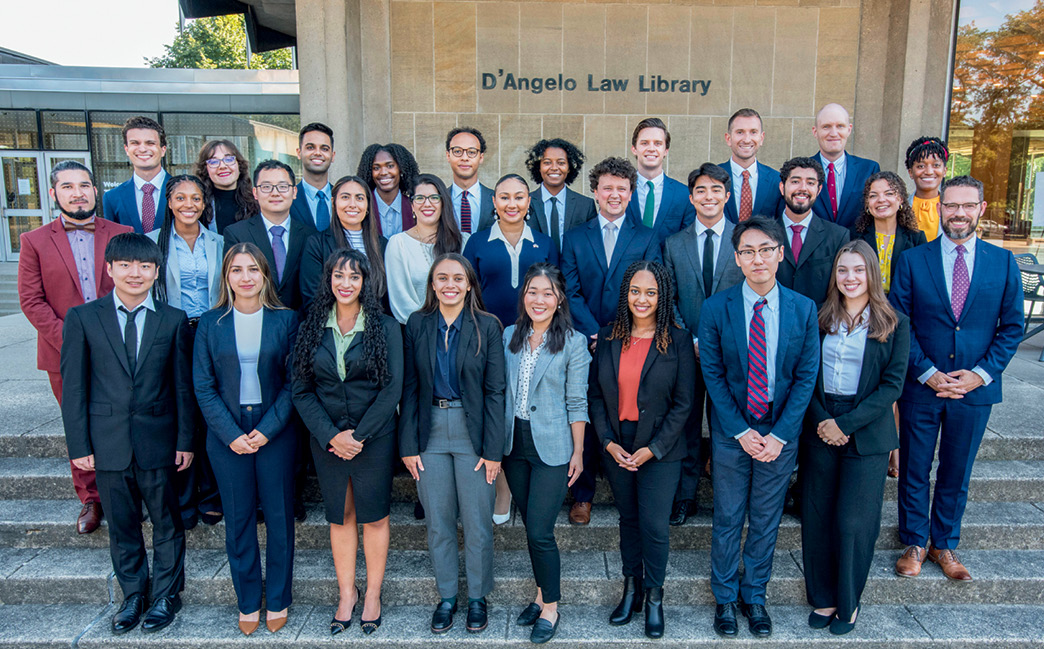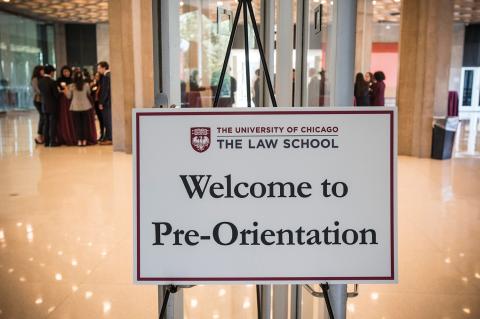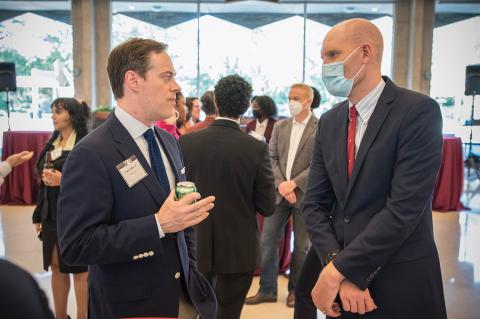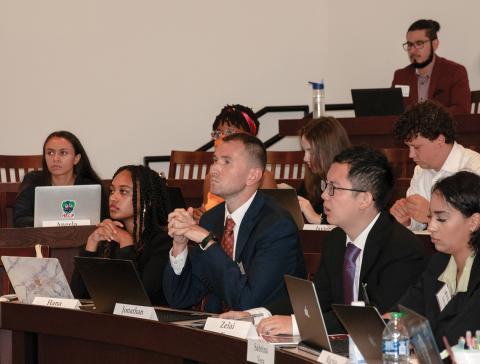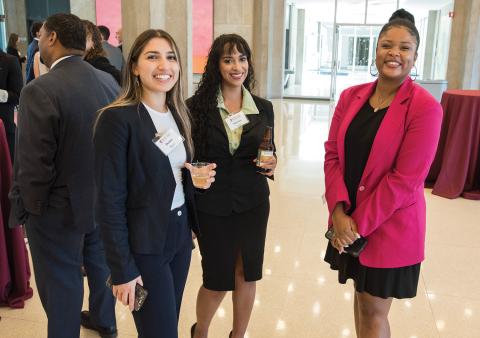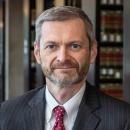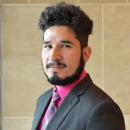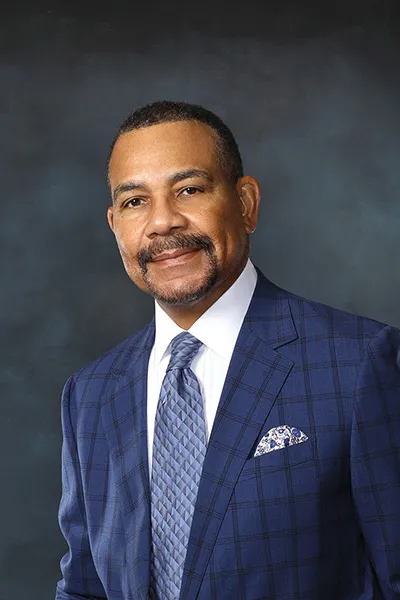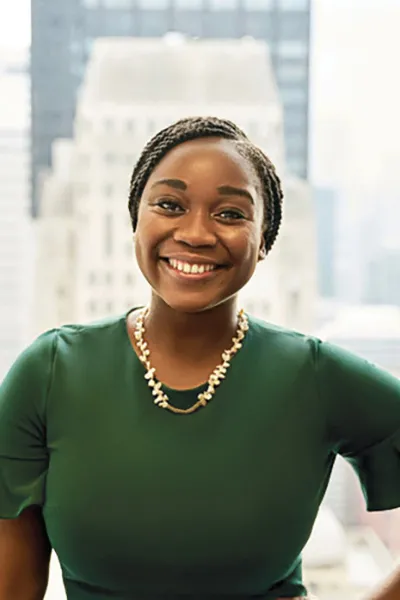‘You Get a Toe in the Water’
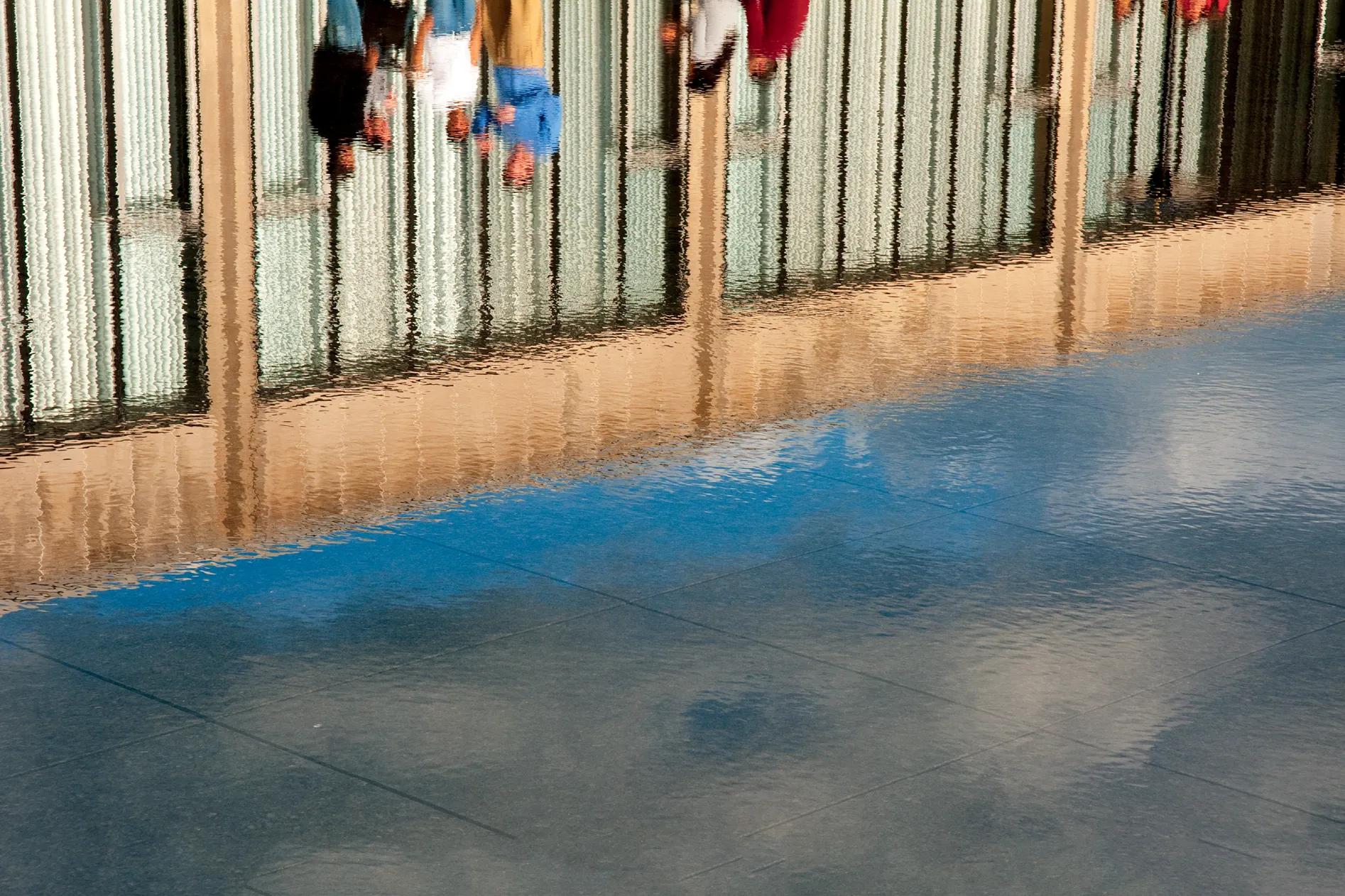
One morning in September, before classes had even begun, a Law School professor walked into Classroom V and, within seconds, launched a Socratic dialogue about strict liability versus negligence. The concepts were new to the entering 1L students in the room and the case was old—the British House of Lords ruled on the appeal in 1868—but that did not dissuade the professor from lobbing cold calls one after the other. Carefully, he guided the discussion, prodding and challenging the students. It was their job to keep up as best they could.
The space in which this unfolded wasn’t just any space. Barack Obama used to teach in Classroom V, before he was president. The topic wasn’t just any topic: the students were learning law and economics, a discipline born at the Law School and developed by generations of Law School faculty, including judges on the US Court of Appeals and the 1991 Nobel laureate in Economics.
And the professor at the front of the room wasn’t just any professor: Thomas J. Miles is a leading scholar of law and economics and the Law School’s dean since 2015.
“That made it a little nerve-racking,” said Flavio Pacheco, ’25, one of 27 students who participated in the Law School’s fourth annual Pre-Orientation Program, which is designed to strengthen the academic, professional, and interpersonal skills of incoming 1L students.
And that was part of the plan: the lecture series by Miles—one segment in the five-day “Pre-O” program—offered participants a peek at the rigors of law school, advice on navigating their classes successfully, and, ultimately, reassurance that they were up to the task.
“It felt like a privilege to have this opportunity—I was one of only 27 students hearing this lecture by the dean,” said Pacheco, who earned his undergraduate degree in molecular and cellular biology in 2018 from Cornell University and then worked for several years at Google. “He was open to questions after, and he answered each one. Now I feel more comfortable with the faculty, and I have a rapport with the dean.”
What’s more, as the Socratic dialogue unfolded, Pacheco and his peers were able to witness the aim of cold calling, which is more about developing reasoning skills than reciting facts. For Pacheco, that clicked; answering a cold call struck him as not terribly different from participating in a professional meeting, something he had done many times at Google.
“I came in really scared for the cold calls, and then I noticed how they actually went . . . and I was like, ‘Oh, this is actually just developing a narrative.’ It was like answering a question in a meeting with loads of people watching you,” he said. “You are bringing a perspective that maybe the class or the [other people in the] meeting don’t have—you voice your opinion, and it becomes a discussion about trying to develop a better approach.”
The Pre-Orientation Program, which takes place immediately before Orientation, aims to ground participants in the community and culture of the Law School, creating a foundation of connections, skills, and knowledge.
“Legal education has a distinctive pedagogy that can be disorienting, but it can be and should be energizing and transformative,” said Miles, who has delivered a set of lectures every year since the Pre-O Program was launched. “The Pre-O Program provides students a brief introduction to some foundations of that pedagogy, such as cold calls and how to read a case. The aspiration is that Pre-O furnishes some guideposts that help point the way to a rewarding experience in the 1L year.”
Pre-Orientation students are drawn to the program for a wide variety of reasons—some related to identity, background, or time away from academia—and they make the case for their participation in a personal statement that accompanies their application to the program.
For Jason Shain, JD/MBA ’24, who participated in the program in 2021 and served as one of two Pre-Orientation leaders in 2022, the program offered a chance to reintegrate into academic life after nearly eight years as an air battle manager in the United States Air Force.
“When there are only about 20 people here, you really get to feel an intimate connection to this space,” said Shain, who earned his undergraduate degree from the College in 2012. “You get to know where things are. You get a toe in the water, and that really plays out during Orientation week and during the first couple weeks in school. You find that there are all these little things that you’ve already learned, even things as simple as: Which is the best printer? It’s the basement printer, by the way.”
All admitted students are encouraged to apply to Pre-Orientation. Those selected learn cold call etiquette, attend panel discussions led by faculty and alumni, and participate in several mini-classes, including Introduction to Critical Race Theory, Introduction to Legal Research and Writing, and the law and economics series taught by Miles. They focus on developing skills such as case analysis, cold calling, outlining, and the use of library services. They get to know the University of Chicago and the city of Chicago—cohorts often meet with Chicago Mayor Lori Lightfoot, ’89—and they create bonds with one another and with the faculty and staff.
“The program is about making sure [the participants] feel comfortable coming into a world that, for some of them, is new—some of them have no other people in their lives who have [attended law or grad school],” said José Luis Rodríguez, the Law School’s senior associate director of student affairs & diversity and inclusion and the program’s organizer. “We want them to feel equipped to do the work and to build community so they don’t feel alone. We want them to know that resources exist for them not only at the Law School but around the UChicago campus. We want them to know that they belong here, and that they can do this.”
For Nyala Carbado, ’25, who earned their undergraduate degree in history and African American studies from UCLA in 2019, Pre-Orientation offered an opportunity to create a support system before the academic quarter had even begun.
“For me, community is one of the most important things,” Carbado said. “Having that early on eased a lot of the worries about whether or not I was going be able to find my place here.”
Camille N’Diaye-Muller, JD/MBA ’24, who participated in Pre-Orientation in 2021 and led the 2022 cohort with Shain, said Pre-Orientation offered her not only that community, but a familiarity with the law and the Law School.
“As a first-generation [law] student, it sometimes feels like everyone has a playbook that you never got,” said N’Diaye-Muller. “Pre-O, as well as the [Law School’s student] affinity groups, do a really good job of plugging some of those gaps in assumed knowledge, such as terminology and what a case brief looks like . . . what’s litigation versus what’s transactional—just all these little things.”
Navigating Cold Calls
A particular source of concern for new law students, of course, is the cold call—and Pre-Orientation aims to demystify the experience. Before the 2022 cohort even began the three-session law and economics series with Miles, they attended a class in “cold call etiquette” taught by Jonathan S. Masur, the John P. Wilson Professor of Law. During the hour-long session, Masur led them through a Socratic dialogue that was interspersed with explanations about the Socratic process and its purpose. At the beginning, he offered tips on etiquette, noting, for instance, that students should resist the urge to interrupt.
“That includes raising your hand if one of your colleagues is struggling a little bit,” he said. “I think a lot of people have this natural inclination to think, ‘I’ll just jump in and help.’ But most [students being cold called] don’t want this very obvious visual signal that they’re having trouble and need to be bailed out.
Waiting until later to ask a question is respectful of the person who’s on call, and it also allows the room to hear that whole conversation.”
After all, Masur said, the struggle can often be an important learning experience for everyone.
To prepare for Masur’s session, each student read a 1927 case, People v. Rizzo, as well as an essay, “How to Read a Legal Opinion.” As he began asking questions, Masur explained that the purpose of a cold call is not to scare students into memorizing their readings, but to engage them in a discussion that will, bit by bit, zero in on the legal rule and the reasoning used in applying it.
“The Socratic method is a great way to get at the truth of matters and to really engage with the issues,” Masur said. “We’re preparing you for what the practice of law will actually be like, and we’re keeping you on your toes and keeping you engaged.”
And part of really engaging, he explained, is letting go of the fear of being wrong.
“You need to be prepared and try hard, but you don’t have to be right,” he said. “Everyone is wrong sometimes. We’re on your side—this isn’t The Paper Chase where we’re trying to humiliate you.”
Ian Peacock, ’25, who came to Law School straight out of a PhD program at UCLA, said the cold calls were “a lot more fun than I expected.”
“I was surprised by how little of it was [a quiz on] factual information and how much of it was about trying to get us to reason, to extrapolate from the case and draw out broader principles,” he said.
As fall quarter unfolded, that understanding helped Peacock to more fully embrace the law school experience; he understood that some of the toughest parts were designed around providing him with a stellar educational experience.
“Even when I get cold called, which is nerve-racking, I know professors want to guide me to the right answer,” he said in early November. “They’re trying to help me understand, not make me look bad. This perspective also makes me more comfortable asking if the professor can rephrase a question or clarify a point, either during class or after. This perspective also helps when I’m poring over my readings every night. I know that my professors—or the cumulative wisdom of many professors over the years—have put a lot of thought into the reading assignments and have curated these assignments with the intention of improving my understanding and skills in the law. Reading can feel more like a fun challenge of trying to figure out what I’m intended to discover rather than something to get out of the way.”
Carbado, too, said they appreciated the opportunity to gain insight into cold calling at the Law School. The sessions eased—though they didn’t erase—their fears about the Socratic method.
“I could see that the professors were really invested in ensuring that we understand the materials and figure out solutions and that was why they were using the Socratic method,” they said.
Rodríguez said he hoped Pre-Orientation would illuminate the process and help students apply what they learned earlier in their education to the law school setting, which he noted can be very different from undergraduate or other graduate programs.
“Raising hands and interrupting looks very different in a law classroom,” he said. “So we want to remove some of the anxiety by showing students how cold calls should work. We also want to help students understand how to take up space appropriately in a room—making sure your voice is heard but also making sure your peers’ voices are heard.”
Building a Network
The program also focused on introducing students to other parts of the 1L experience that might feel new, including how to take a final. After the three-session law and economics class, the students took an exam and then debriefed afterward with Miles.
“It put into perspective what is really expected in law school,” Pacheco said.
Pacheco, who moved to Florida from Brazil when he was 17, was accustomed to navigating rigorous new environments: when he arrived in the Orlando area after high school, he learned English while working four jobs and attending Seminole State College. One of those jobs—alongside work as a tutor, house cleaner, and retail sales associate—was as a research assistant to a biology professor who was studying adipose tissue metabolism. He ultimately earned a spot at Cornell University, where he majored in cellular and molecular biology and minored in law and society, graduating with a bachelor’s degree in 2018.
For him, certain aspects of the law school experience were familiar—hard work, respectful debate, research—but law school itself was not.
“I had done a lot of immunology research, which often involved pondering a single question for a really, really long time,” he said. “In law school, it feels like you’re drinking from a fire hose.”
Nobody in his family had been to law school—he’s a first-generation college student and first-generation professional. For that and other reasons, he was intrigued when he read about the Pre-Orientation Program.
At that point, he had been working at Google for four years, and even his undergraduate experience was fading into the recesses of his memory.
“Even though my job was demanding, I didn’t really remember what it was like to be in class or have a professor tell you what to do,” he said. “This was an attractive proposition: come to law school before your classmates and see what it's like. I figured at least it would make law school less intimidating.”
Several weeks in, Pacheco said that his Pre-Orientation experience had proven successful and had led to a deeper engagement with the Law School.
“Thus far, the long-lasting impacts of the Pre-O program can be summarized in (1) continued friendship, (2) closeness with administration, and (3) increased sense of belonging in the classroom,” he wrote in an email near the end of October. “Additionally, the program has pushed me to run for 1L rep for LSA [the Law Students Association]—which was successful—to continue supporting student programming.”
Peacock had entered Pre-Orientation hoping it would give him an opportunity to build connections with his classmates. Married with a toddler at home, Peacock knew his routine might differ from that of other students. He was used to being busy—he defended his doctoral dissertation at UCLA the day before flying to Chicago—but he worried his juggle would present a barrier to full engagement in Law School life.
By the time the first week of classes rolled around, though, his concerns had lessened. Pre-Orientation had given him the grounding, the practical knowledge, and the friendships he needed for a strong start.
“The people I met in Pre-O feel like my best friends—16 or 17 of them are coming over tonight to my place for a potluck dinner,” he said two days before classes began. “Some of them are in my Bigelow [section], too, so when classes start, it will be nice to have these built-in friends.”
As N’Diaye-Muller explained, that network can be crucial to law school success, which is why, as a Pre-Orientation leader she was intentional about creating space for “all those community-building moments.”
She knew from experience how important that could be. She had built other relationships throughout the building that made it easier to find support when she needed it.
“It made the Law School feel like a community early on—it made it homier,” she said. “I developed relationships with administrators like Dean [of Students Charles] Todd and [Associate Dean for Career Services] Lois Casaleggi—I don’t think I fully appreciated how important that was at first but I really do now.”
And she built relationships with her fellow Pre-Orientation participants, including Shain, who became one of her best friends.
“When all else fails, you have 25 people you have this shared experience with,” she said, referring to the number of participants in the 2021 cohort. “It’s definitely something I leaned on in the beginning. [I’d ask questions] like, ‘I just had my first cold call—how did everyone else’s go?’ It was just the little things like that that made everything less overwhelming.”
The 2023 Pre-Orientation program was made possible with support from our sponsors, ArentFox Schiff and Sidley Austin.
